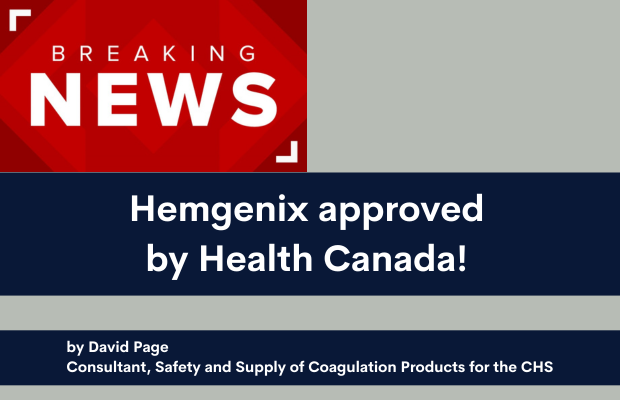Health Canada approves Hemgenix gene therapy for hemophilia B

Ottawa, October 26, 2023 – Health Canada has authorized Hemgenix (etranacogene dezaparvovec), gene therapy for the treatment of hemophilia B. Hemgenix is indicated for the treatment of adults with hemophilia B who require routine prophylaxis to prevent or reduce the frequency of bleeding episodes.
Hemgenix is a one-time, single dose treatment from CSL Behring. This Notice of Compliance allowing the marketing of Hemgenix in Canada is only the first step on the road to patient access.
Hemgenix was approved by the U.S. Food and Drug Administration (FDA) in November 2022 and by the European Medicines Agency (EMA) in February 2023.
A second gene therapy for hemophilia B from Pfizer, fidanacogene elaparvovec is under review by Health Canada and a decision can be expected in the next several months. Fidanacogene elaparvovec has not yet been approved anywhere in the world. Indeed, Pfizer’s first submission to a regulatory agency was to Health Canada.
Notice of compliance from Health Canada does not mean a new drug becomes accessible. The next stage is the health technology assessment (HTA). For Québec, this is performed by the Institut national d’excellence en santé et en services sociaux (INESSS), and for the rest of Canada by the Canadian Agency for Drugs and Technologies in Health (CADTH). These agencies produce recommendations to their respective provincial and territorial governments on the cost-effectiveness of a new drug in comparison with current therapies. CADTH and INESSS can recommend introducing the drug, not introducing it, or introducing it with conditions, for example, significant reductions on the list price. These reviews take six months and are already underway. Therefore, recommendations can be expected late in 2023 or early in 2024. The Canadian Hemophilia Society had made submissions to CADTH and INESSS on both gene therapies.
Submission to CADTH for fidanacogene elaparvovec (Benegene) – August 2023
Submission to CADTH for etranacogene dezaparvovec (Hemgenix) – October 2023
Gene therapy for hemophilia B is not being reviewed in the same way as previous coagulation products, that is, through the Canadian Blood Services/CADTH process for plasma proteins and related products. For the first time ever in the field of hemophilia, gene therapy (if reimbursed) would not be added to the CBS drug formulary, but rather to each province’s own formulary. The formulary pathway in Québec remains undecided.
Instead, gene therapies for hemophilia B will proceed to the third stage on the long road to accessibility: price negotiations between the governments and the manufacturers. These are conducted by the pan-Canadian Pricing Alliance (pCPA) on behalf of the federal, provincial and territorial governments. There is no set time frame for these negotiations.
Finally, the last stage is the decision, or rather decisions. It will be up to each government to decide whether or not to add these gene therapies to its formulary. This means that there could be different decisions in different provinces, and unequitable access across the country. Again, decisions by governments can be quick or very long, and are unpredictable.
Hemophilia A
Biomarin’s valoctocogene roxaparvovec-rvox (tradename of Roctavian in the U.S. and Europe) for hemophilia A was approved by the EMA in August 2022 and, after several delays, by the U.S. FDA in June 2023. A very, very small number of patients have received this gene therapy since it received marketing approvals.
In Canada, Biomarin is exploring the possibility of making a New Drug Submission for Roctavian in 2024 or 2025.




